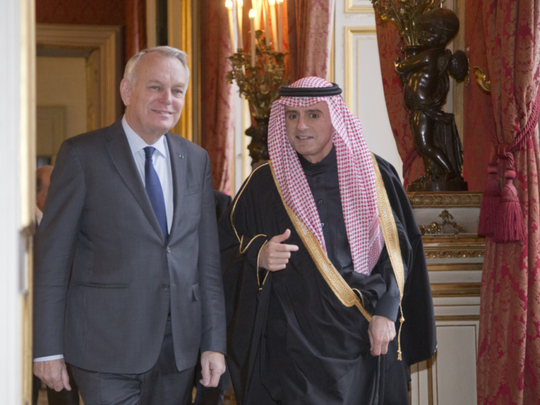
Beirut: Saudi officials revealed that one of the reasons why King Salman Bin Abdul Aziz ended Riyadh’s military aid to Lebanon was to prevent Hezbollah from acquiring highly lethal weapons.
According to the pan-Arab Al Hayat newspaper, Saudis feared that the arms grant would land in the hands of Hezbollah “given that the party’s control over the military is increasing day by day”, without divulging the name or nationality of its high-ranking source.
It fell on Saudi Foreign Minister Adel Al Jubeir to clarify to Agence France Presse in Paris that his country did not cancel the $3 billion (Dh11.01 billion) contract but opted to take the French weapons itself.
“We didn’t stop the contract,” affirmed Al Jubeir, “it’s just going to Saudi Arabia, not to Hezbollah... We have a situation where Lebanon’s decisions have been hijacked by Hezbollah.”
It was the first time that a Saudi official had made such a clear declaration. Al Jubeir, a no-nonsense speaker who accompanied Crown Prince Mohammad Bin Nayef on an official visit to France, expanded on various contentions that the two sides discussed, especially after last Wednesday’s decision by the six-member Gulf Cooperation Council to declare Hezbollah a “terrorist” group on account of the organisation’s ties with Iran and the latter’s use of the militia to extend its influence throughout the region — from Sana’a to Beirut.
Saudi Arabia, Bahrain and the UAE had already sanctioned Hezbollah in 2013 in reprisal for its armed intervention in Syria, though recent involvements in Yemen and Kuwait, where Hezbollah operatives were arrested for plotting acts of violence, added to the urgency.
In his public pronouncement, Prince Mohammad Bin Nayef explained that Riyadh valued its ties with Lebanon, and would “continue to help it at the economic level and in assisting it take in Syrian refugees”, even if it was crystal clear that the proverbial red line was drawn vis-a-vis the Lebanese army.
Al Jubeir’s comments corroborated a report published in Al Sharq Al Awsat, which explained how Odas, the French defence sales company under the command of Admiral Edward Guillaud, planned to channel the agreed upon transactions. “The arms will be handed to Riyadh... It [the Saudi leadership] will decide what it wants to do with them according to developments. Paris respects any Saudi decision,” the Saudi paper quoted a source, without stating whether Riyadh can at a later stage ship these defence and security systems to the Lebanese army.
In April 2015, Lebanon received the first batch of French weapons — about 50 Milan anti-tank missiles — funded by the $3 billion Saudi grant, which included many more items, ranging from armoured vehicles to helicopters to truck-mounted cannons and advanced anti-tank missiles. A second batch was expected this spring in what was a four-years programme that also promised seven years of training as well as ten years of equipment maintenance.
The anonymous source that spoke with Al Hayat claimed that President Francois Hollande, Prime Minister Manuel Valls, Foreign Minister Jean-Marc Ayrault, and Defence Minister Jean-Yves Le Drian, all stressed to Prince Nayef the need to “leave the door open” to unfreeze the army grant “if the Lebanese authorities took the initiative” and put their house in order. It did not report on the heir apparent’s response.












